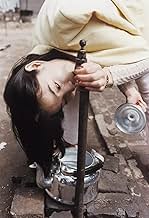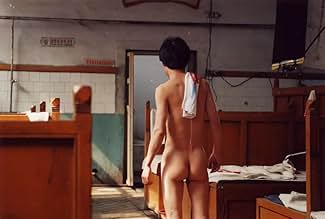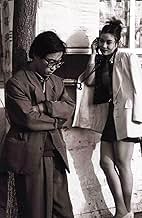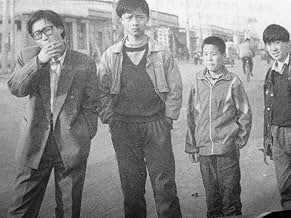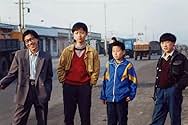CALIFICACIÓN DE IMDb
7.4/10
3.6 k
TU CALIFICACIÓN
Una historia de amor entre un carterista y una chica que hace la calle.Una historia de amor entre un carterista y una chica que hace la calle.Una historia de amor entre un carterista y una chica que hace la calle.
- Dirección
- Guionista
- Elenco
- Premios
- 7 premios ganados y 1 nominación en total
- Dirección
- Guionista
- Todo el elenco y el equipo
- Producción, taquilla y más en IMDbPro
Opiniones destacadas
A 20-something in rural China who makes his small time living being a pickpocket faces two changes which pressure his life: a very public crackdown on crime, and a childhood friend having moved on to a respectable life, soon to be married, but not inviting him to the wedding. China itself seems to be changing, with signs of construction and modernization everywhere, but the main character, Xiao Wu (Wang Hongwei) is not progressing along with it, stubbornly sticking to his ways, despite the warnings from others.
There is a sense of forlorn emptiness here, as Xiao Wu starts falling for a karaoke girl, desperately seeking more meaning out of their relationship than she is. He returns home to his family, who are peasant farmers, and finds that his brothers are also moving on in life, and his father is angry to the point of casting him out. There are glimmers of him wanting to be a good person, like when he gives his mother a ring, or when he anonymously returns ID cards from the wallets he's stolen because they're hard for the owners to replace, but he continues stealing and seems hopelessly non-aspirational, thus making him a tough character to like.
Gandhi once said that "the true measure of any society can be found in how it treats its most vulnerable members," and while you could argue that Xiao Wu himself has preyed on the vulnerable, when he's publicly chastised on TV and later handcuffed to a post and surrounded by people gawking at him, the feeling of vulnerability is intense. We get the conflicting sense of it being just for him to punished, but at the same time, pity for him arriving at this place in life, and what his prospects might be. Therein lies the power of the film, and I certainly admired it.
The reason for not giving the film a higher rating was just a lack of personal enjoyment for what was a dreary story, centered exclusively on the main character, who was stuck in one gear. I would have loved a contrast in the development of his friend's or family's characters, those getting on in the world as best they can. Certainly a solid debut film from Jia Zhangke though.
There is a sense of forlorn emptiness here, as Xiao Wu starts falling for a karaoke girl, desperately seeking more meaning out of their relationship than she is. He returns home to his family, who are peasant farmers, and finds that his brothers are also moving on in life, and his father is angry to the point of casting him out. There are glimmers of him wanting to be a good person, like when he gives his mother a ring, or when he anonymously returns ID cards from the wallets he's stolen because they're hard for the owners to replace, but he continues stealing and seems hopelessly non-aspirational, thus making him a tough character to like.
Gandhi once said that "the true measure of any society can be found in how it treats its most vulnerable members," and while you could argue that Xiao Wu himself has preyed on the vulnerable, when he's publicly chastised on TV and later handcuffed to a post and surrounded by people gawking at him, the feeling of vulnerability is intense. We get the conflicting sense of it being just for him to punished, but at the same time, pity for him arriving at this place in life, and what his prospects might be. Therein lies the power of the film, and I certainly admired it.
The reason for not giving the film a higher rating was just a lack of personal enjoyment for what was a dreary story, centered exclusively on the main character, who was stuck in one gear. I would have loved a contrast in the development of his friend's or family's characters, those getting on in the world as best they can. Certainly a solid debut film from Jia Zhangke though.
English title had given (Bresson's treasure) this prominent Jia Zhangke's iconic Chinese rural magical realism masterpiece a kind of tone of obsessional Heimlich in our hero Wang Hongwei, who graduated from the same film school as Jia Zhangke, but credited as a "non-professional actor", it's weird, but pretty rarefied.
I don't know how Jia Zhangke created the perfect grotesque atmosphere between the two estranged or intimate conversations. His bravura handle of trims of pickpocketing details, with the remaining of Xiao Wu's personal life is brilliant.
He is a bad, quotidian-stolen pickpocket, but he never lost his soul as a generous, wholehearted Valentine and a brother.
The shaking camera is aptly combined with the realistic setting and crew. The performance is divine, especially Wang Hongwei, he looks fun and mysterious, charismatic.
The blackout of the romantic scene is a bravura technique. Wang Hongwei ascends.
I don't know how Jia Zhangke created the perfect grotesque atmosphere between the two estranged or intimate conversations. His bravura handle of trims of pickpocketing details, with the remaining of Xiao Wu's personal life is brilliant.
He is a bad, quotidian-stolen pickpocket, but he never lost his soul as a generous, wholehearted Valentine and a brother.
The shaking camera is aptly combined with the realistic setting and crew. The performance is divine, especially Wang Hongwei, he looks fun and mysterious, charismatic.
The blackout of the romantic scene is a bravura technique. Wang Hongwei ascends.
"This is a film about our worries and our uneasiness. Having to cope with a dysfunctional society, we take refuge in solitude which is a substitute for dignity
It is finally a film about my native town and about contemporary China." - Jia Zhangke
A sense of longing permeates Xiao Wu, a 1997 film by the acclaimed independent Chinese director Jia Zhangke (Platform, Unknown Pleasures). Set in Jia's home city of Fengyang in Shanxi province, the film is basically a series of incidents in the life of petty thief and pickpocket, Xiao Wu. It is a compelling portrait of an individual in free-fall and, like other films by the director, shows the corrupting influence of Western values on an entire generation of Chinese. The film is reminiscent of the works of Robert Bresson in its use of non-professional actors, environmental sound, and in its spare cinematography by Yu Lik-Wai.
Xiao Wu (Hong Wei Wang) wanders about aimlessly with lots of money to spend and little to spend it on except call girls at the local karaoke bar. He befriends Mei Mei (Hao Hongjian), and they start to develop a tentative relationship but his social awkwardness leads to ultimate rejection. Wu's friends have given up the life of crime and do not want to have anymore to do with him. His best friend, Jin Xiao Yong has just been voted a "Model Entrepreneur" for his activities in cigarette trafficking and does not invite Wu to his wedding. He even returns Wu's gift of money because it is "tainted". The scene between the two old friends discussing the wedding is heartbreaking in the look of rejection on Wu's face.
With no other work to fall back on, Wu is forced to continue his petty crimes, constantly running afoul of the police. In the background, the government has issued an order to round up street criminals. Wu seems bewildered by the fact that his friends do not want to associate with him and he is unable to grasp the meaning of the police crackdown. He grows increasingly alienated and lonely as he loses his friends who go straight, his girl friend Mei Mei who leaves town, and his family who eject him after an argument over a ring.
Jia captures the rhythm and feel of day-to-day life in Fengyang. This is life as it is actually lived, not as a series of dramatic events forced into a narrative structure. His film succeeds not only as social commentary but also as an acutely perceptive realization of the psychology of a self-absorbed individual. One of the most revealing scenes is when Wu stubbornly refuses to sing with Mei Mei at the karaoke bar but instead goes to a bathhouse and, alone and naked, sings a plaintive song to the empty room. After Mei Mei leaves him, things seem to spiral downward for Wu. In a final sequence, he is shown after his arrest, not as a victim or hero, but as an off-screen object to be gazed at and mocked by people in the street. It is a scene of personal tragedy, but in the universality of its compassion, it becomes a spiritual revelation. Xiao Wu is one of the best films of the 90s.
A sense of longing permeates Xiao Wu, a 1997 film by the acclaimed independent Chinese director Jia Zhangke (Platform, Unknown Pleasures). Set in Jia's home city of Fengyang in Shanxi province, the film is basically a series of incidents in the life of petty thief and pickpocket, Xiao Wu. It is a compelling portrait of an individual in free-fall and, like other films by the director, shows the corrupting influence of Western values on an entire generation of Chinese. The film is reminiscent of the works of Robert Bresson in its use of non-professional actors, environmental sound, and in its spare cinematography by Yu Lik-Wai.
Xiao Wu (Hong Wei Wang) wanders about aimlessly with lots of money to spend and little to spend it on except call girls at the local karaoke bar. He befriends Mei Mei (Hao Hongjian), and they start to develop a tentative relationship but his social awkwardness leads to ultimate rejection. Wu's friends have given up the life of crime and do not want to have anymore to do with him. His best friend, Jin Xiao Yong has just been voted a "Model Entrepreneur" for his activities in cigarette trafficking and does not invite Wu to his wedding. He even returns Wu's gift of money because it is "tainted". The scene between the two old friends discussing the wedding is heartbreaking in the look of rejection on Wu's face.
With no other work to fall back on, Wu is forced to continue his petty crimes, constantly running afoul of the police. In the background, the government has issued an order to round up street criminals. Wu seems bewildered by the fact that his friends do not want to associate with him and he is unable to grasp the meaning of the police crackdown. He grows increasingly alienated and lonely as he loses his friends who go straight, his girl friend Mei Mei who leaves town, and his family who eject him after an argument over a ring.
Jia captures the rhythm and feel of day-to-day life in Fengyang. This is life as it is actually lived, not as a series of dramatic events forced into a narrative structure. His film succeeds not only as social commentary but also as an acutely perceptive realization of the psychology of a self-absorbed individual. One of the most revealing scenes is when Wu stubbornly refuses to sing with Mei Mei at the karaoke bar but instead goes to a bathhouse and, alone and naked, sings a plaintive song to the empty room. After Mei Mei leaves him, things seem to spiral downward for Wu. In a final sequence, he is shown after his arrest, not as a victim or hero, but as an off-screen object to be gazed at and mocked by people in the street. It is a scene of personal tragedy, but in the universality of its compassion, it becomes a spiritual revelation. Xiao Wu is one of the best films of the 90s.
The sound mixing is garbage, with a substantial amount of noise. The dialect cannot be understood. The camera is shaky. The performance is pretty amateurish. The pace is slow. All in all, this film is an unwatchable mess.
10cd1793
Xiaowu is an average young man in a typical small town in China. He is shy, stubborn, values friendship, sometimes vanity-driven, sometimes even romantic. And he is a pick-pocket.
It is surprising that although hundreds of millions of people lead their lives like xiaowu, "Xiao Wu" is the first candid depiction of their life in the many years of chinese filmmaking. I was particularly struck by the camera's honesty: run-down buildings along littered streets, filthy public bath places, hidden brothels camouflaged as karaoke shops...
As the country opens up for economical changes, some people have "their own ways" to take advantage of the change and became rich, while the rest struggle to make a living. The film provided vivid portraits of people you probably know or have heard of: the former pick-pocket buddy of xiaowu who became a famous entrepreneur and grew ashamed of having a friend who picks pockets; the girl who works at a Karaoke but tells her mom that she's at school, who dreams of becoming a star and fell in love with xiaowu but eventually "contracted" herself to a rich man from Shan Xi...
Even if you are not particularly interested in the setting of the film, the universal conflict of dignity and making a living, vanity and friendship, dream and reality, makes this film very interesting to watch.
Bravo, Jia ZhangKe! I give this film a 10/10 for being the first of a genre that will shine in chinese cinema.
It is surprising that although hundreds of millions of people lead their lives like xiaowu, "Xiao Wu" is the first candid depiction of their life in the many years of chinese filmmaking. I was particularly struck by the camera's honesty: run-down buildings along littered streets, filthy public bath places, hidden brothels camouflaged as karaoke shops...
As the country opens up for economical changes, some people have "their own ways" to take advantage of the change and became rich, while the rest struggle to make a living. The film provided vivid portraits of people you probably know or have heard of: the former pick-pocket buddy of xiaowu who became a famous entrepreneur and grew ashamed of having a friend who picks pockets; the girl who works at a Karaoke but tells her mom that she's at school, who dreams of becoming a star and fell in love with xiaowu but eventually "contracted" herself to a rich man from Shan Xi...
Even if you are not particularly interested in the setting of the film, the universal conflict of dignity and making a living, vanity and friendship, dream and reality, makes this film very interesting to watch.
Bravo, Jia ZhangKe! I give this film a 10/10 for being the first of a genre that will shine in chinese cinema.
¿Sabías que…?
- TriviaJia Zhang-ke: the man sent by Xiao Yang to return Xiao Wu's wedding present.
- ConexionesReferenced in Ren xiao yao (2002)
Selecciones populares
Inicia sesión para calificar y agrega a la lista de videos para obtener recomendaciones personalizadas
- How long is Pickpocket?Con tecnología de Alexa
Detalles
Taquilla
- Total a nivel mundial
- USD 1,569
- Tiempo de ejecución
- 1h 50min(110 min)
- Color
- Relación de aspecto
- 1.37 : 1
Contribuir a esta página
Sugiere una edición o agrega el contenido que falta

